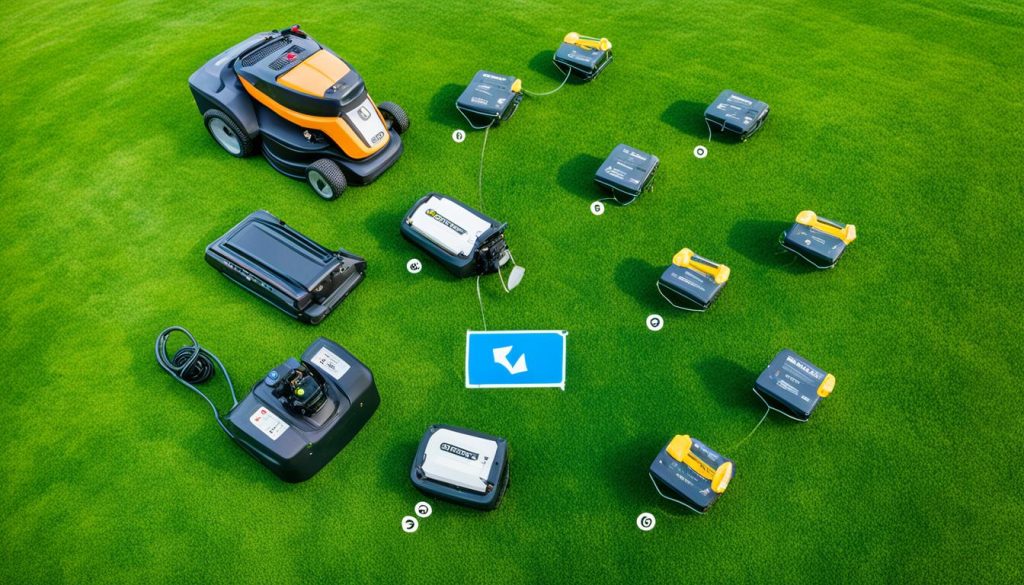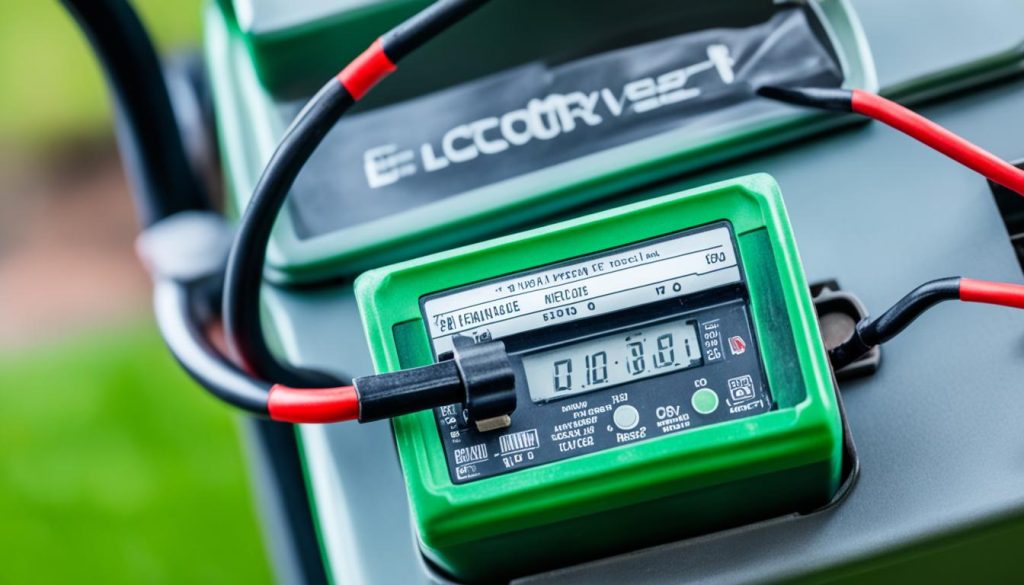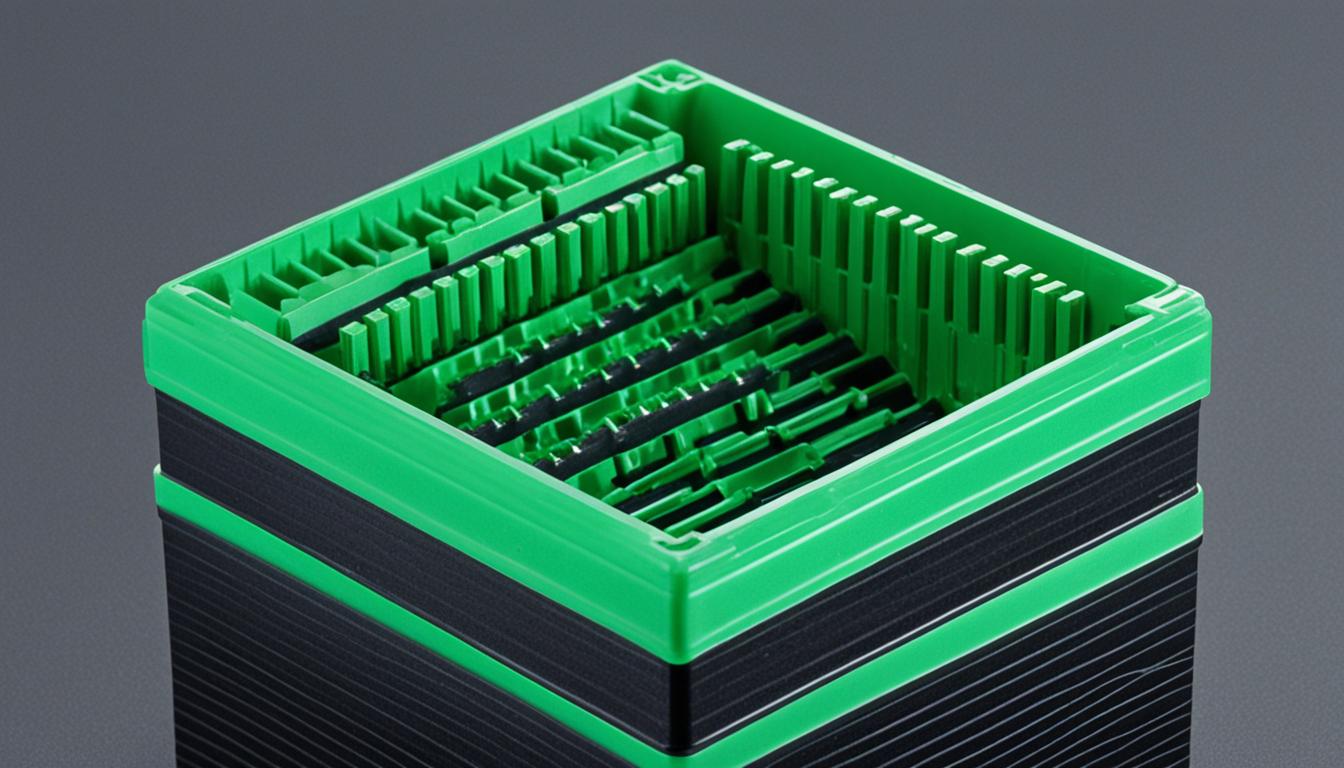When it comes to the voltage of a lawn mower battery, how much power is really needed to keep your mower running smoothly? Is it a matter of higher volts for better performance, or is there a sweet spot that ensures optimal functionality? Let’s uncover the truth behind lawn mower battery voltage and how it affects your machine.
Key Takeaways:
- A lawn mower battery typically operates at either 6 volts or 12 volts, depending on the number of cells it has.
- Higher voltage doesn’t always mean better performance; it’s important to choose the correct voltage based on your mower’s specifications.
- Maintaining the correct voltage is crucial for optimal battery performance and the longevity of your mower.
- Regular maintenance, including proper charging and cleaning battery connections, can help extend the lifespan of your lawn mower battery.
- Understanding the role of the alternator in maintaining battery charge is essential for ensuring proper voltage levels and preventing battery failure.
Signs of a dead lawn mower battery
When it comes to your lawn mower, a dead battery can bring your landscaping plans to a grinding halt. Knowing the signs of a dead lawn mower battery can help you diagnose the problem quickly and take the necessary steps to get your mower up and running again.
A dead lawn mower battery exhibits several clues that indicate it needs attention. If your mower fails to start when you turn the ignition, it’s one of the most prominent signs that your battery is dead and needs a recharge or replacement. Additionally, if you hear a clicking sound when attempting to start the mower, it’s a clear indication that the battery is not providing enough power to kickstart the engine.
One vital aspect of maintaining your lawn mower’s battery is regularly checking the battery connections. Loose or corroded connections can impede the flow of power, leading to poor battery performance or even a dead battery. Ensuring a clean and secure connection can go a long way in maximizing your battery’s lifespan.
If you observe any of these signs, it’s essential to take action promptly to restore power to your lawn mower. Depending on the severity of the battery’s condition, you may need to recharge it or replace it entirely. Remember, regular maintenance and prompt attention to battery issues can save you time and frustration when it comes to keeping your lawn mower in optimal working condition.
| Signs of a Dead Lawn Mower Battery |
|---|
| The mower does not start when you try to turn it on |
| Hearing a clicking sound when attempting to start the mower |
| Loose or corroded battery connections |
Testing the voltage of a lawn mower battery
To ensure the proper functioning of your lawn mower battery, it’s important to regularly test its voltage. Testing the voltage will help you determine whether the battery is providing the necessary power for your mower. Thankfully, checking the voltage of a lawn mower battery is a simple process that can be done using a multimeter or voltmeter.
Here’s a step-by-step guide on how to test the voltage of a lawn mower battery:
- Set your multimeter or voltmeter to measure DC voltage.
- Connect the red probe of the multimeter to the positive terminal of the battery.
- Connect the black probe of the multimeter to the negative terminal of the battery.
- Read the voltage displayed on the multimeter or voltmeter.
For a healthy 6-volt lawn mower battery, the voltage reading should be around 6 volts. Similarly, a healthy 12-volt battery should have a reading around 12 volts. If the voltage reading is significantly lower than the expected value, it may indicate that the battery needs to be replaced.
Regularly testing the voltage of your lawn mower battery will help you identify any potential issues and ensure that your mower continues to perform at its best. Consider adding voltage checks to your routine maintenance tasks to keep your lawn mower running smoothly.
| Battery Voltage | Expected Reading |
|---|---|
| 6 volts | Around 6 volts |
| 12 volts | Around 12 volts |
Maintaining a lawn mower battery
Proper maintenance is key to extending the life of your lawn mower battery and ensuring its optimal performance. By following these essential tips, you can maximize the lifespan of your battery and avoid potential issues down the line.
Clean Battery Connections
Regularly inspect and clean the battery connections to remove any dirt, debris, or corrosion. A clean and tight connection will ensure efficient power transfer and prevent voltage drops. Use a battery terminal cleaner or a mixture of baking soda and water to remove corrosion.
Regular Charging
Charge your lawn mower battery regularly, especially during periods of extended non-use. This will help maintain the battery’s charge and prevent it from fully discharging, which can reduce its lifespan. Use a charger that is compatible with your battery type and follow the manufacturer’s instructions for charging times and current ratings.
Proper Storage
When the lawn mower is not in use, store the battery in a cool and dry place, away from direct sunlight and extreme temperatures. Extreme heat or cold can cause damage to the battery and reduce its performance. Consider using a battery storage case to protect it from physical damage during storage and transportation.
Check Water Level (For Flooded Batteries)
If you have a flooded lead-acid battery, check the water level regularly and add distilled water as needed. Maintaining the proper water level ensures that the battery cells are adequately submerged and helps prevent drying out or sulfation, which can reduce battery performance.
| Tips for Maintaining a Lawn Mower Battery |
|---|
| Clean battery connections regularly |
| Charge the battery regularly, especially during periods of extended non-use |
| Store the battery in a cool, dry place |
| Check water level in flooded batteries and add distilled water as needed |
By following these simple tips, you can ensure that your lawn mower battery remains in optimal condition, extends its lifespan, and provides reliable power for your lawn mowing needs.
Choosing the right battery voltage for your lawn mower
When it comes to choosing the right battery voltage for your lawn mower, it’s essential to consider the specific model and requirements of your mower. Most lawn mowers commonly use either 6-volt or 12-volt batteries. By referring to the manufacturer’s specifications or consulting the owner’s manual, you can determine the ideal voltage for your particular mower.
Using the correct voltage is crucial to ensure optimal performance and prevent damage to your mower’s electrical system. Choosing a battery with the right voltage provides the necessary power for your mower’s motor to start and operate efficiently.
Consulting the manufacturer’s specifications or the owner’s manual allows you to make an informed decision regarding the appropriate voltage for your lawn mower battery. It takes into account the design and capabilities of your specific mower model, ensuring compatibility and maximizing performance.
By following the recommended voltage guidelines, you can trust that your lawn mower’s electrical system will function as intended, delivering reliable and efficient operation. Preventing damage to the electrical system also helps avoid costly repairs or the need for premature battery replacement.
Whether you own a small residential mower or a more powerful commercial-grade machine, understanding and choosing the right battery voltage is key to the longevity and performance of your lawn mower.

Benefits of Choosing the Correct Voltage
- Optimal performance of your lawn mower’s electrical system
- Improved starting power and operation efficiency
- Prevention of damage to the electrical system and other components
- Maximized battery lifespan
Differences between 6-volt and 12-volt batteries
When it comes to lawn mower batteries, there are two common voltage options: 6-volt and 12-volt. While both types of batteries serve the purpose of powering the mower, they have distinct characteristics and are suitable for different applications. Understanding the differences between these two voltages can help you make an informed decision when choosing a battery for your lawn mower.
6-volt batteries
6-volt batteries are the more common option for lawn mowers, especially for residential use. These batteries are typically lead-acid batteries that consist of three cells, each providing 2 volts. Despite their lower voltage, 6-volt batteries are capable of delivering sufficient power to operate most standard residential lawn mowers.
Pros of 6-volt batteries:
- Common and widely available
- Suitable for most residential lawn mowers
- Cost-effective option
Cons of 6-volt batteries:
- May not provide enough power for larger or more powerful lawn mowers
- Shorter lifespan compared to 12-volt batteries
12-volt batteries
12-volt batteries, on the other hand, offer higher voltage and are typically used in larger and more powerful lawn mowers. These batteries consist of six cells, with each cell providing 2 volts. The higher voltage of 12-volt batteries translates to increased starting power and a longer overall lifespan.
Pros of 12-volt batteries:
- Higher starting power, ideal for larger lawn mowers
- Longer lifespan compared to 6-volt batteries
- Can handle more demanding cutting conditions
Cons of 12-volt batteries:
- Less common and may be harder to find
- Higher cost compared to 6-volt batteries
| 6-volt Batteries | 12-volt Batteries | |
|---|---|---|
| Number of cells | 3 | 6 |
| Starting power | Adequate for most residential mowers | Higher, suitable for larger mowers |
| Lifespan | Shorter | Longer |
| Availability | Common | Less common |
| Cost | Lower | Higher |
Ultimately, the choice between a 6-volt and a 12-volt battery depends on the size, power requirements, and cutting conditions of your lawn mower. For most residential mowers, a 6-volt battery will suffice. However, if you have a larger or more powerful mower, or if you frequently encounter challenging cutting conditions, a 12-volt battery may be the better option. Consider the pros and cons, as well as the specific needs of your mower, to make the optimal choice for your lawn care needs.
Voltage differences between riding and push lawn mowers
When it comes to battery voltage, riding mowers and push mowers have distinct requirements. Gas-powered riding mowers often utilize lead-acid batteries with either 6 volts or 12 volts. On the other hand, push mowers and electric riding mowers commonly rely on lithium-ion batteries for their power needs. Lithium-ion batteries offer higher voltage capabilities, presenting advantages such as longer lifespan and faster charging times compared to lead-acid batteries.
To illustrate the differences between these types of batteries, let’s take a closer look at their specifications:
| Battery Type | Voltage Range | Lifespan | Charging Time |
|---|---|---|---|
| Lead-Acid (Riding Mower) | 6V or 12V | Varying, typically 2-5 years | Longer charging time |
| Lithium-Ion (Push Mower / Electric Riding Mower) | Depends on the specific model | Varying, typically 5-10 years | Faster charging time |
Table: Comparison of battery types for riding and push mowers.
The table above highlights the key differences between lead-acid and lithium-ion batteries. While lead-acid batteries are commonly found in riding mowers due to their affordability and reliability, lithium-ion batteries are preferred for their higher voltage and advanced technology. Additionally, lithium-ion batteries generally have a longer lifespan and can be charged more quickly, enhancing the overall efficiency and convenience of push mowers and electric riding mowers.
Advantages of Lithium-Ion Batteries for Push Mowers and Electric Riding Mowers
- Higher voltage output: Lithium-ion batteries provide increased power, allowing push mowers and electric riding mowers to tackle tougher terrains and longer mowing sessions.
- Longer lifespan: With proper care and maintenance, lithium-ion batteries can last significantly longer than lead-acid batteries, reducing the need for frequent replacements.
- Faster charging: Lithium-ion batteries have shorter charging times, minimizing downtime and ensuring a more efficient mowing experience.
- Lightweight and compact: Lithium-ion batteries are generally lighter and more compact than lead-acid batteries, making them easier to handle and store.
- Environmentally friendly: Lithium-ion batteries do not contain hazardous materials like lead-acid batteries, leading to less environmental impact.
Overall, the choice of battery voltage for your lawn mower depends on factors such as the type of mower, its power requirements, and personal preferences. While riding mowers typically use lead-acid batteries with either 6 volts or 12 volts, push mowers and electric riding mowers often utilize higher voltage lithium-ion batteries for enhanced performance and longevity.
How to determine the voltage of your lawn mower battery
There are several ways to determine the voltage of your lawn mower battery. By following these methods, you can accurately check the voltage and ensure optimal performance.
- Inspect the Battery: Start by examining the battery itself. Look for a label or marking indicating the voltage. Many batteries will have this information clearly displayed.
- Refer to the User Manual: If the battery label is not present or clear, consult the user manual of your lawn mower. The manual should provide detailed information about the battery voltage.
- Count the Cells: In the case of lead-acid batteries, you can determine the voltage by counting the number of cells. Each cell typically represents a certain voltage. Multiply the number of cells by the voltage per cell to calculate the total battery voltage.
By utilizing these methods, you can confidently determine the voltage of your lawn mower battery and ensure it is compatible with your mower’s requirements.
| Method | Description |
|---|---|
| Inspect the Battery | Examine the battery label for information on the voltage. |
| Refer to the User Manual | Consult the user manual of your lawn mower for details on the battery voltage. |
| Count the Cells | For lead-acid batteries, count the cells and multiply by the voltage per cell to determine the total battery voltage. |

Importance of maintaining the correct voltage for a lawn mower battery
Maintaining the correct voltage is crucial for the optimal performance of a lawn mower battery. Using a battery with the wrong voltage can have a significant impact on the overall functionality of the battery and the mower itself.
An incorrect voltage can result in insufficient power output, which directly affects the mower’s ability to start and operate efficiently. This could lead to frustrating experiences of the mower failing to start, resulting in delays and inconvenience. It may also cause the mower’s engine to run at a suboptimal level, affecting its cutting power and overall performance. Inconsistent power output can also put unnecessary stress on the mower’s electrical system, potentially causing long-term damage.
To avoid these issues and ensure the longevity of your lawn mower battery, it is essential to regularly check and maintain the correct voltage. By doing so, you can guarantee that the battery functions properly and provides the necessary power for smooth and efficient lawn mowing.
Tips for charging a lawn mower battery
When it comes to charging your lawn mower battery, following best practices is essential for optimal performance and longevity. By adhering to these tips, you can ensure that your battery is charged correctly and maintained in good condition.
Tip 1: Use a Charger Designed for Your Battery
Using a charger specifically designed for the type of battery you have is crucial. Different battery chemistries, such as lead-acid or lithium-ion, require different charging methods. Consult the manufacturer’s recommendations or the user manual to identify the appropriate charger for your lawn mower battery.
Tip 2: Avoid Overcharging
Overcharging can be detrimental to your battery’s health and lead to premature failure. Follow the manufacturer’s instructions regarding charging time and current rating to prevent overcharging. Once the battery is fully charged, disconnect it from the charger to avoid any potential damage.
Tip 3: Charge in a Well-Ventilated Area
When charging your lawn mower battery, make sure to do it in a well-ventilated area. Charging batteries can sometimes produce gases that are potentially hazardous. Therefore, it is important to charge the battery in a properly ventilated space to promote a safe charging environment.
Tip 4: Regular Charging for Extended Non-Use
If your lawn mower is not in use for an extended period, regularly charge the battery to maintain its health. Batteries that are left discharged for extended periods can experience irreversible damage and may require replacement. Follow the manufacturer’s guidelines for charging intervals during non-use to optimize the battery’s longevity.
Tip 5: Follow Safety Precautions
When working with a lawn mower battery, always prioritize safety. Wear protective gloves and goggles to shield yourself from any potential hazards. Adhere to the manufacturer’s safety guidelines and instructions to ensure a safe charging process.
By following these tips, you can effectively charge your lawn mower battery, prolong its lifespan, and ensure reliable performance when you need it most.
Common misconceptions about lawn mower battery voltage
When it comes to lawn mower battery voltage, there are some common misconceptions that can lead to confusion. Understanding the truth behind these misconceptions is essential for making informed decisions about your lawn mower’s battery needs.
Misconception: Higher Voltage Batteries are Always Better
One commonly held belief is that higher voltage batteries are always superior, providing more power and performance. However, the appropriate battery voltage for your lawn mower depends on its specific requirements. Using a higher voltage battery than recommended can actually be detrimental and may result in damage to your mower’s electrical system. It’s important to consult your lawn mower’s manufacturer specifications or owner’s manual to determine the correct battery voltage for optimal performance.
Misconception: Any 12-Volt Charger can be Used to Charge a Lawn Mower Battery
Another misconception is that any 12-volt charger can be used to charge a lawn mower battery. However, this is not recommended as not all chargers provide the necessary current required for efficient charging. Using an incorrect charger can lead to undercharging or overcharging, which can potentially reduce the battery’s lifespan. To ensure proper charging, it is best to use a charger specifically designed for the voltage and type of battery in your lawn mower.
| Myth | Reality |
|---|---|
| Higher voltage batteries always deliver better performance. | The appropriate voltage depends on the specific mower’s requirements. |
| Any 12-volt charger can be used to charge a lawn mower battery. | Using an incorrect charger may not provide the necessary current for efficient charging. |
By debunking these misconceptions, you can make informed decisions about the voltage and charging requirements of your lawn mower battery. Understanding the specific voltage needs of your mower and using the appropriate charger will help ensure optimal performance and prolong the lifespan of your battery.
Factors that affect the lifespan of a lawn mower battery
The lifespan of a lawn mower battery is influenced by various factors that can either extend or shorten its overall durability. By understanding these factors and taking the necessary precautions, you can ensure your battery lasts as long as possible.
Regular maintenance
Proper maintenance plays a crucial role in extending the lifespan of a lawn mower battery. By regularly charging the battery according to the manufacturer’s instructions and keeping the battery connections clean and tight, you can help prevent premature deterioration and ensure optimal performance.
Frequency of use
The frequency at which you use your lawn mower can impact the lifespan of the battery. Batteries that are regularly used and charged have a higher chance of lasting longer than those that sit idle for extended periods. If your mower sees infrequent use, consider charging the battery periodically to maintain its charge level and overall health.
Operating conditions
The operating conditions in which a lawn mower battery is used can heavily influence its lifespan. Factors such as extreme temperatures and excessive vibration can contribute to battery degradation. To mitigate these effects, store your mower in a cool, dry place and avoid using it in extreme weather conditions.
Correct voltage usage
Using the correct voltage for your lawn mower battery is essential for maximizing its lifespan. Overcharging or deep discharging the battery can quickly diminish its capacity and overall longevity. Always ensure you are using a charger specifically designed for your battery’s voltage and follow the recommended charging guidelines.
| Factors affecting the lifespan of a lawn mower battery | Impact on battery lifespan |
|---|---|
| Regular maintenance | Extends lifespan |
| Frequency of use | Regular use and charging improves lifespan |
| Operating conditions | Extreme conditions can shorten lifespan |
| Correct voltage usage | Using the correct voltage helps extend lifespan |
By considering these factors and implementing proper maintenance practices, you can significantly prolong the lifespan of your lawn mower battery and ensure reliable performance season after season.
The role of the alternator in maintaining battery charge
The alternator plays a crucial role in the overall performance of a lawn mower battery. It serves two primary functions: generating electricity and charging the battery while the mower’s engine is running. This ensures that the battery has sufficient charge for the next start and supplies power to the electrical systems while the mower is in operation.
A well-functioning alternator should provide a voltage range between 13.6 volts and 14.4 volts at idle tick over. This optimal voltage level is necessary to maintain the charge of the battery and ensure its longevity. When the alternator is in good condition, it can effectively charge the battery, preventing undercharging and overcharging issues that can lead to battery failure.
When the alternator is not supplying the correct charge, it can have a significant impact on the lawn mower battery voltage. Undercharging occurs when the alternator fails to provide enough power to recharge the battery fully. This can result in the battery not reaching its optimal voltage level, leading to diminished performance and reduced battery life.
On the other hand, overcharging happens when the alternator provides too much voltage to the battery, exceeding its optimal voltage range. Overcharging can cause the battery to overheat, leading to electrolyte loss, internal damage, and reduced battery life. It is important to avoid both undercharging and overcharging to ensure the longevity and efficiency of the lawn mower battery.
In summary, the alternator plays a crucial role in maintaining battery charge in a lawn mower. It generates electricity and charges the battery while the engine is running, ensuring that the battery has adequate power for the next start and supplies power to the electrical systems during operation. A properly functioning alternator with the correct voltage output helps prevent undercharging and overcharging issues that can lead to battery failure, ultimately extending the lifespan of the lawn mower battery.
| Issue | Impact |
|---|---|
| Undercharging | – Battery does not reach optimal voltage level – Diminished performance – Reduced battery life |
| Overcharging | – Battery overheating – Electrolyte loss – Internal damage – Reduced battery life |
Conclusion
In conclusion, the voltage of a lawn mower battery plays a crucial role in the performance and longevity of your mower. Most lawn mowers are equipped with either 6-volt or 12-volt batteries, with 6-volt batteries being more common. It is essential to determine the correct voltage for your specific mower model and ensure proper maintenance to maximize its efficiency.
Regularly checking the voltage of your lawn mower battery is essential to ensure that it is operating within the appropriate range. By using a multimeter or voltmeter, you can easily test the voltage and determine if the battery needs to be replaced. Additionally, following proper charging practices, such as using a charger designed for your battery type and avoiding overcharging, is crucial for maintaining the battery’s optimal performance.
Factors such as regular maintenance, proper charging, and environmental conditions can significantly impact the lifespan of your lawn mower battery. By maintaining the correct voltage, keeping the battery connections clean, and storing it in a cool, dry place, you can extend the battery’s lifespan and avoid premature failure. Overall, understanding the importance of battery voltage and implementing appropriate maintenance practices will ensure that your lawn mower operates smoothly and efficiently for years to come.





